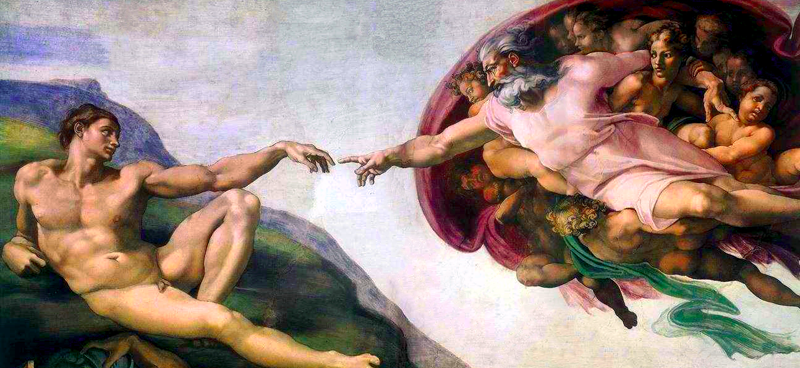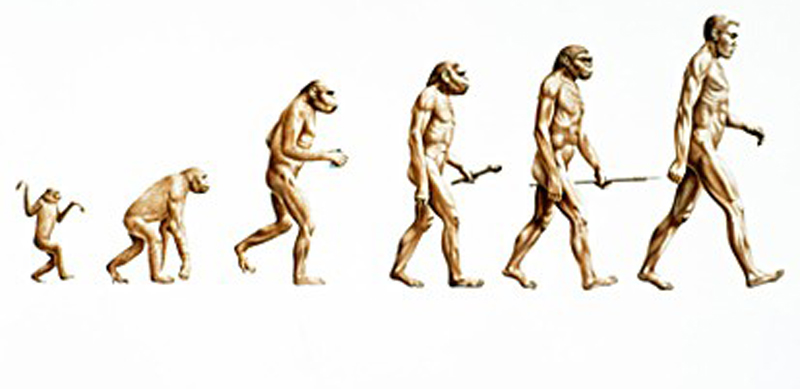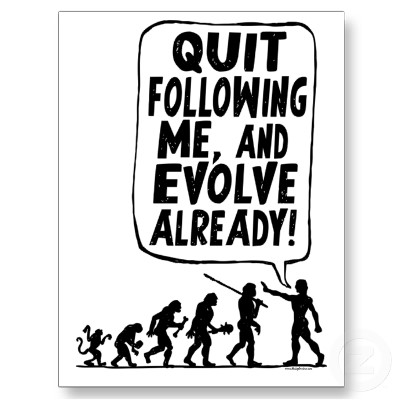Did a God or Gods create the universe? EDITED
-
@alan fraser said:
You are blurring a colloquial use of language with a specific, technical term...like people who insist on saying about Evolution "It's only a theory." as if it's no more than a hunch.
 false equivalence is the whole premise of creationism in the US. Such a waste of precious educational resources/ time.
false equivalence is the whole premise of creationism in the US. Such a waste of precious educational resources/ time.
Indeed Brodie - faith is faith, science is science. Never the twain shall meet. -
I was going to say the same thing Alan did. Good thing he beat me to it, so I needn't put on the dreaded thinking cap on again.
Nor get the dictionary out.
One thought, though. I find it odd one would even want to suggest faith and science are equally valid in the same way. To my mind, that's a negation of faith's very core: the irrational act of actively embracing a concept one, by definition, cannot proof to be true or even compeletely understand.
-
@alan fraser said:
Well, now I'm really bored. So sorry, Brodie, I've got no intention of addressing all that tedium (which in places is self-contradictory)...especially as you continue to insist on turning the argument on its head and demanding the burden of proof from those not making the claims. My position on anything in the Bible is irrelevant.
I was looking for your position on a historical event that we might refine the discussion a bit rather than meandering on irrelevant points. If we don't even agree that Jesus existed any discussion on the resurrection would have been putting the cart before the horse. If you don't want to have that discussion that's fine. You'd asked for historical proof though so I was just trying to go down that road.
@unknownuser said:
I don't misunderstand the Christian position at all. Unlike you, I did grow up going to church and Sunday School...Anglican and Methodist. I even still attend from time to time. not only that, but I spent many years teaching in an educational establishmen run by Catholic nuns. So I don't need any lessons in the theology, thanks.
I meant no offense. I simply found the question rooted in a theological misunderstanding despite your history. Maybe it's a misunderstanding on your part, maybe it's a denominational misunderstanding, I don't know.
@unknownuser said:
I do not need to disprove anything in the Bible to justify my position...any more than you have presumably taken the trouble to disprove all other claims by all other religions in order to justify yours. I only need to be satisfied that Life, the Universe and Everything can be proven to function without the need for a deity...and it can.
Maybe you're satisfied with the current naturalistic explanations for things like the creation of the universe and abiogenesis. I'm not.
@unknownuser said:
You can disagree all you like with my and Tom's position, but you are still wrong in equating theism and atheism as equally valid logical conclusions based on the evidence to hand. Faith is called faith for a reason. What you are trying to do is redefine it as a logical conclusion based on hard evidence...or data as you call it. It is no such thing.
It's one thing to say I'm wrong, it's another to refute my points.
@unknownuser said:
You are perfectly entitled to your faith, but you cross the line when you start equating evidence for god with empirical scientific evidence. You are blurring a colloquial use of language with a specific, technical term...like people who insist on saying about Evolution "It's only a theory." as if it's no more than a hunch.
I'm not sure what you're referring to here. I've spoken of philosophical arguments for the existence of God and I've spoken about historical evidence of the resurrection, for example. But it's not my position that God can be proven by some sort of repeatable scientific process through experiments and observation.
-Brodie
-
And where is this historical evidence of the resurrection?
-
@unknownuser said:
Such a waste of precious educational resources/ time.
I agree. . .I've been following this thread from a distance. . . .a long distance. . . interesting thoughts on both sides and eventhough this debate has been going on for 2000 years I was absolutely sure that it could all be solved here on the SU forum. It's where I go for answers.

...as this thread keeps repeating . . .Science is of the mind--Faith of the heart. . .and never the twain shall meet? I don't personally believe that, but I believe it's out of my range of knowledge.
So where have you guys landed on this thing?
Any "converts" one way or the other?
No? . .. I thought not.
Maybe Eric (boofredlay) can set up a little speed challenge voting poll thing--each side declare victory. . .and put this one to bed.
 VS
VS
-
You left out this one David

-

-
@unknownuser said:
One thought, though. I find it odd one would even want to suggest faith and science are equally valid in the same way. To my mind, that's a negation of faith's very core: the irrational act of actively embracing a concept one, by definition, cannot proof to be true or even compeletely understand.
I think that the idea that faith is supposed to insinuate a lack of proof is false. When I say I have 'faith' I don't mean that it's in opposition to 'proof.' I mean 'faith' in the sense of 'trust.' It's in a similar sense that I have faithin my doctor to take care of me. It's not in contrast to the proofwhich I have that he'll heal me, but rather because of it (he's done it before, he's taken an oath, he went to school and obtained the necessary knowledge, etc.).
That said, there is a sense in which there's no irrefutable evidence for God. But that's not what I expect to find.
-Brodie
-
@box said:
And where is this historical evidence of the resurrection?
I appreciate the question but honestly I've got little heart to get into it at this point. I don't think anyone here is terribly interested in having the conversation. At this point it feels like too broad a conversation to get into. No doubt we'd need to get into why the gospels are a viable historical source of information, even if we don't accept them as 'gospel' truth. And then we'd have to get into alternative theories. And then we'd get pushed back into arguing the existence of God. We obviously all find that pattern tiresome. While many here seem to have a thorough understanding of the scientific method, I don't see much evidence of a familiarity with the historical method and what the differences are.
-Brodie
-
I am very familiar with the historical method, which is why I asked to see your evidence.
If you are going to point to the bible as your evidence then the conversation is pointless. -
@unknownuser said:
...as this thread keeps repeating . . .Science is of the mind--Faith of the heart. . .and never the twain shall meet? I don't personally believe that, but I believe it's out of my range of knowledge.
Sorry, I just said that one for fun. I think the two operate in separate spheres that can be complimentary, sort of like Brodie's doctor example. There is still a person to person trust relationship, but the doctor better be operating from scientific knowledge, not scripture...
-
@box said:
I am very familiar with the historical method, which is why I asked to see your evidence.
If you are going to point to the bible as your evidence then the conversation is pointless.Well, at least that's a starting point. Before I start spouting random factoids about the Bible, though, is there a specific reason you don't believe that it can be used as a historical source of information? To keep things concise I'd like to stick to the gospels here as it's primarily where we find information on the resurrection.
Edit: one notable exception I probably should have mentioned is 1 Cor 15:3-8 which deals directly with the resurrection and is generally accepted to be a sort of extremely early creed
-Brodie
-
The bible is an historical novel, written by many many people over centuries.
People who have heard stories, people with political agendas, people with their own ideas.
Parts of the bible can be verified as accurate to certain historical events other parts are simple allegory.
There is no doubt the book exists and existed from way way back, but it still a book written by men.If you got a bunch of different people together, some SU novices, some SU experts and some with specific plug-ins to sell and some who just wanted to be there because it felt good, and asked them to edit all the posts on Sketchucation into one definitive book on how to work with SU, you would have a bible. Some of it would be accurate, some would be biased and some would be plain wrong. It would make a great read and people would swear by it because it is written, but it don't make it the inerrant word of Mike Lucey.
So, show me some non biblical evidence.
-
@unknownuser said:
To my mind, that's a negation of faith's very core: the irrational act of actively embracing a concept one, by definition, cannot proof to be true or even completely understand.
An excerpt from an article I've read here: http://www.zeitun-eg.org/thomas.htm
@unknownuser said:
"What's less easy to understand is the thought-out, rational pursuit of God against one's better judgement. Loving God and seeking to serve God against one's interests, plus the sheer difficulty of the attempt to love one's neighbor, is, it seems to me, the best proof of religion."
or just plain faith, IMO.
Then Jesus told him, "Because you have seen me, you have believed; blessed are those who have not seen and yet have believed." (John 20:29)
Pretty well sums it up for me.
Cheers.
-
Box, you're speaking in vast generalities and I'm trying to hone in on something we can sink our teeth into. I think there's some extra-biblical evidence we can talk about but it's not nearly as convincing or persuasive, in my mind, as a good historical look at the evidence within the Bible.
For example, if we dig into 1 Cor 15:3-8 a bit...
@unknownuser said:
For what I received I passed on to you as of first importance[a]: that Christ died for our sins according to the Scriptures, that he was buried, that he was raised on the third day according to the Scriptures, and that he appeared to Cephas,[b] and then to the Twelve. After that, he appeared to more than five hundred of the brothers and sisters at the same time, most of whom are still living, though some have fallen asleep. Then he appeared to James, then to all the apostles, and last of all he appeared to me also, as to one abnormally born.
This is generally believed by historians to be an early creedal statement that dates to within a few years of Jesus' death.
Jesus died in the early 30's and Paul was converted some 3-5 years later. 1 Corinthians was written in the mid 50's putting the statement at MOST about 20 years after Jesus' death. But Paul implies that he 'received' the creed which historians believe to have an Aramaic character which would suggest that it was created at a time when the church was made primarily of Jews rather than gentiles. Based on these and other historical evidences, this points to the very early date of the creed. This counters the notion that the resurrection could have been some sort of later evolution of an idea that developed over time.
Starting here, do you have any disputed on historical grounds?
-Brodie
-
I'm sorry, I see no point in continuing with this.
You believe that what is said in the bible is true, I believe it is the stories of many people and as such is written with an agenda.
We will have to agree to disagree. -
So ... we're backing up the claims made in the Bible by using ... the Bible? This has been an interesting discussion, but it seems we've entered the realm of the absurd now. I'm out.
-
I'm simply suggesting for the sake of the argument that the Bible is a book - a collection of letters, histories, poems, etc. It's illogical to NOT believe something simply because it happens to be in a book you disagree with. I man wrote a letter, we can use the historical method to derive a reasonable estimation as to when the letter was written whether that letter is from Paul, or Plato.
I'm not suggesting that because Paul said it in the Bible, it's true. I'm merely showing that based on the historical method, we can illustrate that this statement was common among Christians within a few years after Jesus' death.
If you understand the historical method then I'll ask that you refute my points from within that method rather than making illogical claims and generalizations. Otherwise, concede the point but tell me why it's irrelevant.
-Brodie
-
@box said:
I'm sorry, I see no point in continuing with this.
You believe that what is said in the bible is true, I believe it is the stories of many people and as such is written with an agenda.
We will have to agree to disagree.see above
-
@box said:
@box said:
I'm sorry, I see no point in continuing with this.
You believe that what is said in the bible is true, I believe it is the stories of many people and as such is written with an agenda.
We will have to agree to disagree.see above
I find your blatant intellectual dishonesty refreshing. It makes the pointless conversations much more short and sweet.
-Brodie
Advertisement







